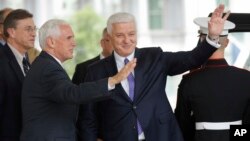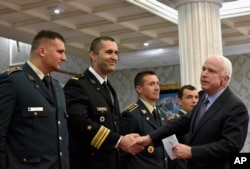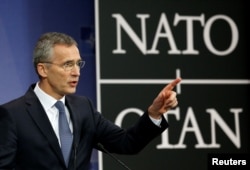Nearly two weeks after President Donald Trump reportedly blindsided National Security advisers in Brussels by failing to stick to a White House speech reaffirming U.S. commitments to NATO's Article 5, Vice President Mike Pence on Monday took the stage alongside Montenegro's head of state to do exactly that.
Addressing an Atlantic Council awards ceremony at Washington's Ritz Carlton hotel Monday evening — held just hours after Montenegro's formal NATO accession ceremony at the State Department — Pence, fresh from private White House meetings with Montenegrin Prime Minister Dusko Markovic, vowed “unwavering commitment” to Article 5.
“Make no mistake ... we will meet our obligations to our people to provide for the collective defense of all of our allies,” Pence was quoted as saying in Politico coverage of the event. “An attack on one of us is an attack on all of us.”
Article 5 defined
NATO's Article 5 defines an attack on any NATO member as an attack on all NATO members. The clause has only been triggered once, following the attacks on 9/11.
“As we look to the future, we cannot only look inward,” Pence said. “NATO's open door must always remain so … NATO is as important today as it was at its founding nearly 70 years ago.”
Montenegro became NATO's 29th member of NATO and been praised by the United States for joining the Western military alliance, despite Russian obstruction that included a failed attempt to overthrow the pro-Western government in October 2016.
Russia even warned of retaliation against Montenegro's “hostile course” and condemned the small Balkan country's “anti-Russian hysteria” during the State Department ceremony marking the accession.
“Allow me to rephrase on this historic day the words of [NASA astronaut] Neil Armstrong,” Markovic announced to the awards ceremony, vowing national readiness to assume membership responsibilities. “This is a small day for the United States and its allies, but a great day for Montenegro.”
'NATO has never been more important'
Senator John McCain, (R-Ariz.), chairman of the Senate Armed Services Committee, called NATO's first enlargement in eight years a significant step toward greater trans-Atlantic integration at a pivotal time.
“Given the increasingly complex challenges we face on both sides of the Atlantic, NATO has never been more important,” McCain said in a prepared statement issued on his website. “In the face of renewed Russian aggression, increasingly frequent terror attacks, and looming cybersecurity threats, the trans-Atlantic alliance must stand together. We welcome the assistance of Montenegro as the 29th NATO member state in combating these threats.”
In an interview with VOA's Serbian Service, NATO Secretary General Jens Stoltenberg said that “NATO will stand together with Montenegro against any kind of pressure and outside interference.”
“We have seen many reports about more Russian interference in the Western Balkans; we saw the failed coup attempt in Montenegro last year,” he said. “For me, this just highlights the importance of building strong security and defense institutions and strengthening resilience.”
Regional stability
Montenegro's NATO membership, he added, will guarantee the Balkan country's independence and contribute to regional stability.
“Montenegro is important not least because of its location in the Western Balkans," Stoltenberg said. “NATO has a history there; we helped to end two ethnic wars. We see many challenges in the Western Balkans and we would like to work with Montenegro to address those challenges.”
Stoltenberg said that Montenegro, together with other allies, can help other neighboring countries in the region, such as aspiring NATO members Bosnia and Macedonia.
NATO has only a partnership with Serbia, with whose new president, Aleksandar Vucic, Stoltenberg claims “regular contact.”
This report originated in VOA's Serbian Service.






